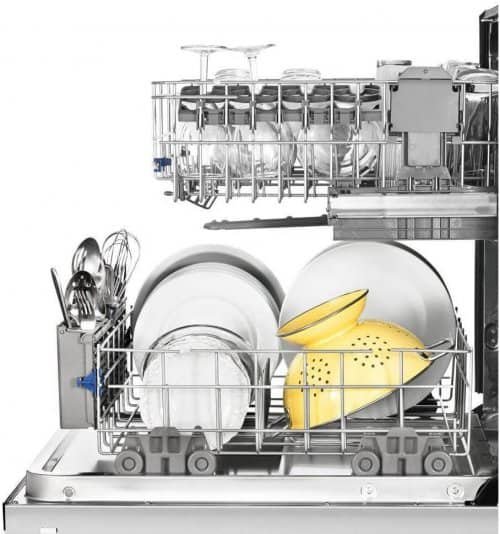When it comes to keeping our dishes clean, dishwasher detergent plays a crucial role. However, sometimes we may notice a white film or residue on our dishes after running the dishwasher. This residue can be frustrating and unsightly. In this article, we will explore the causes of dishwasher detergent residue and provide effective solutions to get rid of it. By following these tips, you can ensure that your dishes come out sparkling clean every time.
Table of Contents
What causes dishwasher detergent residue?
Dishwasher detergent residue can be caused by a combination of factors. Hard water, using too much detergent, or not rinsing dishes properly before loading the dishwasher are some common causes. The minerals present in hard water can react with the detergent, leaving behind a film on the dishes.
Effects of dishwasher detergent residue on dishes
Dishwasher detergent residue not only affects the appearance of dishes but can also impact their cleanliness. The residue can make dishes feel gritty or sticky, and it may even leave spots or streaks. Additionally, over time, the residue can build up and affect the performance of your dishwasher.
Prevention Measures
To prevent dishwasher detergent residue from occurring in the first place, it’s important to follow some preventive measures.
Choosing the right dishwasher detergent
Selecting a high-quality dishwasher detergent specifically designed for your dishwasher is crucial. Look for products that are phosphate-free and suitable for your water hardness level. Reading product labels and customer reviews can help you make an informed decision.
Using the correct amount of detergent
Using too much detergent can lead to excessive sudsing and residue buildup. Follow the manufacturer’s instructions on the detergent packaging to determine the correct amount to use for your dishwasher model.
Ensuring proper water temperature
Hot water is essential for the proper functioning of dishwasher detergent. Make sure your dishwasher is set to the recommended water temperature, usually around 120°F (49°C). Insufficiently hot water can result in detergent not dissolving properly and leaving residue on the dishes.
Loading the dishwasher correctly
Properly loading your dishwasher can make a significant difference in preventing detergent residue. Avoid overcrowding the dishwasher, as it can prevent proper water circulation. Also, ensure that dishes are not stacked or blocking the spray arms, which distribute water and detergent.

Removing Dishwasher Detergent Residue
If you’re already facing the issue of dishwasher detergent residue, don’t worry. There are several effective methods to remove it.
Vinegar solution
One popular method is to use a vinegar solution. Place a cup of white vinegar on the top rack of your dishwasher and run a hot water cycle. Vinegar helps break down the residue and removes any lingering odors.
Baking soda method
Baking soda is another natural and readily available remedy. Sprinkle a generous amount of baking soda on the bottom of your dishwasher and run a short hot water cycle. The baking soda will help scrub away the residue and eliminate any unpleasant smells.
Citric acid solution
Citric acid is a powerful agent for removing dishwasher detergent residue. Dissolve a few tablespoons of citric acid in water and pour it into the detergent compartment. Run a hot water cycle, and the citric acid will break down the residue, leaving your dishes clean and residue-free.
Commercial dishwasher cleaner
If the above methods don’t yield satisfactory results, you can opt for a commercial dishwasher cleaner. These cleaners are specifically formulated to tackle stubborn residue and restore your dishwasher’s performance. Follow the instructions provided on the cleaner packaging for optimal results.
Maintaining a Residue-Free Dishwasher
Preventing dishwasher detergent residue in the long term requires regular maintenance.
Regular cleaning routine
Clean your dishwasher regularly to prevent residue buildup. Remove and clean the filter, as accumulated debris can hinder proper water circulation. Wipe down the interior with a damp cloth and check for any clogs or blockages.
Checking spray arms and filters
Ensure that the spray arms are clean and free from blockages. If necessary, remove them and rinse them thoroughly to remove any residue or debris. Check the dishwasher’s filter and clean or replace it as needed.
Using rinse aid
Rinse aid is a helpful addition to your dishwasher routine. It helps to prevent water droplets from forming and leaving spots or streaks on your dishes. Fill the rinse aid compartment in your dishwasher according to the manufacturer’s instructions.
Can I use regular dish soap in the dishwasher?
No, regular dish soap should not be used in the dishwasher. It can cause excessive sudsing and damage your dishwasher.
What is the ideal water temperature for the dishwasher?
The ideal water temperature for the dishwasher is around 120°F (49°C). This ensures proper dissolving of the detergent and effective cleaning.
How often should I clean my dishwasher?
It is recommended to clean your dishwasher once a month to prevent residue buildup and maintain optimal performance.
Can I use bleach to remove dishwasher detergent residue?
No, bleach should not be used to remove dishwasher detergent residue as it can damage the dishwasher and potentially leave harmful residues.
What is the purpose of rinse aid?
Rinse aid helps to prevent water droplets from forming on your dishes, resulting in spotless and streak-free results.
Conclusion
Dishwasher detergent residue can be a common issue, but with the right preventive measures and removal methods, you can easily overcome it. Choose the right detergent, follow the recommended usage guidelines, and maintain a clean dishwasher to ensure your dishes come out spotless and residue-free every time.


1 thought on “How to Get Rid of Dishwasher Detergent Residue”
Comments are closed.